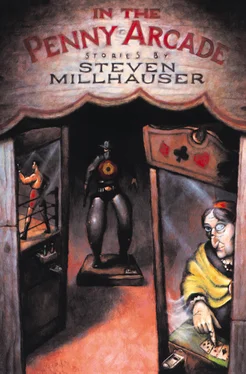She had planned to continue further down the slope, but the slatted red bench in a sun-flooded bend of the path had proved too great an adventure. It was an adventure because it was there at all, demanding nothing, feigning indifference, and promising the secret pleasures of truancy. The wood was warm to her touch. The three hundred pages of The Machining of Plastics in their neatly tied folder remained unedited at her side, and in the late afternoon light, bright but no longer hot, Judith continued to look with pleasure through the opening in the trees at the sunny cliff with its gazebo of pale, peeled logs, and beyond to the dark green and light green and blue green of low hills. On the hills lay darker green patches that slowly moved: the shadows of clouds. They looked like carelessly strewn dark doilies. A young woman in faded blue jeans and a crimson T-shirt lay on her back on the cliff. Her boyfriend sat crosslegged beside her, drinking a can of beer that flashed in the sun. His shadow was so richly black that it might have been wet. They spoke, but quietly, as if hushed by the peacefulness of the view, and Judith would not have wished them to leave. It struck her, watching their stillness, that there was also a pleasurable truancy from play. One of the attractions of the place was its twenty-seven, or was it twenty-nine, scenic trails, and it was possible to feel much too responsible for covering the territory. She had been marching up and down trails all morning and half the afternoon, looking down at valleys with red barns and across at hills with little white houses, identifying fourteen wildflowers with the aid of Peterson’s Field Guide to the Wildflowers of Northeastern and North-central North America and a four-page pamphlet she had bought for ninety-five cents at the gift shop near the dining room, resting only for a few minutes in the rustic gazebos placed along the cliff trails before setting off again, and she realized, seated gratefully on her bench, how delightful it was simply to stop. Simply to stop. At her feet grew a purple wildflower, with four-petaled clusters arranged along the upper part of a thick green stalk, and she purposely refrained from opening her shoulder bag and checking in the purple section of the field guide. The warm sun on her face made her feel healthy and sleepy. Flower, tree, rock, sky — for a moment Judith longed for a world without detail. It would be enough.
She heard footsteps approaching along the upper path and turned to look. A woman, walking slowly, appeared around the bend, and as she did so Judith felt a little sharp burst of annoyance. It was their third encounter of the day. The woman — she couldn’t have been more than twenty-seven or — eight, though indoors she looked thirty — was wearing a black sweater and an ankle-length wraparound in dark blue, with purple and pale-blue swirls. Over her slumped shoulder she wore a large cloth pocketbook with two wide wooden strips at the top; the cloth was dull red with little dark green leaves all over it. A mane of black hair, lightly clasped at the neck, flowed down to the small of her back. She looked at Judith with large dark melancholy eyes that seemed perpetually to be making a mute appeal, and it was above all those eyes with their mute appeal that irritated Judith, who was suddenly afraid the intruder might want to join her on the bench. Indeed she had almost stopped walking and seemed to be looking tentatively at the unoccupied corner of the small bench, where Judith thanked God she had placed her manuscript and her bag. She was afraid the woman might ask if she could sit down, and then what hope was there? But she only looked again at Judith, who looked severely away. The woman had never quite stopped walking, and she now turned off the main path onto the narrow trail leading to the cliff with the gazebo. She stopped halfway, seeing the lovers, and stood for a few moments looking out at the view with one hand resting on top of her pocketbook. She then turned back and, without a glance at Judith, stepped onto the main path and continued down. Judith’s heart was beating quickly; she felt shocked by her own rudeness.
But she couldn’t help it. She had first seen her the night before. Judith had left the office at midafternoon on Friday and arrived barely in time for dinner in the great dining hall, with its thirty or forty small square tables and its darkening view of the hills. The long bus ride from Port Authority had tired her, and she had had to wait twenty minutes for the limousine that carried her and four others up the long, winding road to the Mountain Lodge. But as soon as the chateaulike building came into view, sprawling and turreted in all the exuberance of splendidly bad Victorian taste, the little irritations of the trip fell away from her. Her room was at the top of the south wing, in the rear. She had just enough time to drop her suitcase and take in the patchwork quilt in brown and blue and yellow, the dark, curving headboard with pineapple finials, the pale brown wallpaper with pale pink and pale green nosegays, and the view of blackening green hills under a fading sunset before hurrying along the carpeted corridor, past window nooks with cushioned seats, to the main stairway, with its thick and glistening banister. From the lobby at the foot of the stairs it was not far to the dining hall at the rear of the north wing. Dinner was served from six to eight, and it was seven-forty-five. Many guests still lingered at their tables, and Judith was pleased: she liked the combination of privacy and company provided by a reserved table in a crowd. It so happened that the tables in her immediate vicinity were unoccupied, except for one a few feet away, and at that table sat a woman with melancholy eyes and a mane of black hair. The absence of other diners nearby had the effect of throwing the two of them into accidental relation, and Judith noticed that she and the younger woman seemed to be the only ones dining alone. It was enough to set her, however unreasonably, against acquaintance. Those melancholy and mutely appealing eyes, which seemed to be seeking a soul mate with whom to share, in hushed tones, in a corner of lamplit darkness, intimate disheartening confessions, were only another reason for keeping between them a decent stretch of spiritual distance. With particular annoyance Judith noted the woman’s slumped, defeated shoulders. She longed to say: “Good God, woman, enough. Shoulders back — sit up straight — get a grip on yourself — it can’t be as bad as all that. And stop wearing your sorrow like a string of pearls. He isn’t worth it. Down with it.” She contented herself with studying the menu.
That was the first meeting, if silence and avoidance could in any sense be called a meeting. For Judith it seemed to insist on remaining no less than that. The melancholy woman finished half her slice of pecan pie, lit up a cigarette, and left in a cloud of smoke, without having ventured a syllable. But even the hoped-for silence managed to annoy Judith: it seemed too pointedly a reproach. It was as if it had been up to Judith, who at thirty-six supposed she was the “older woman,” to break the silence and launch them into gloomy intimacy. She, however, was planning to enjoy herself for a change. There was a certain kind of exasperating woman who never recovered from the world of the college dormitory, and spent the rest of her life longing for tragic confidences and cozy confessions in an atmosphere of leathery lounges, heaped ashtrays, and crumpled Almond Joy wrappers crackling faintly while the gray of early dawn showed through the many-paned high windows. The dark woman would probably go searching unhappily for that dormitory until doomsday. She ought to get on with it. But Judith’s good spirits quickly returned. After dinner she made her way back to the lobby, which led to the front lounge, and when she stepped from the side door into the darkness of the open veranda, she felt something expand within her. She walked to the handrail in front, overlooking the lamplit lake. On three sides the long veranda was built on piles over the water. A wicker chair creaked. Footsteps crunched in the graveled paths beside the lake. In the dark, shining water the reflections of windows broke into ripples of yellow as three ducks, forming a triangle, floated by. On the dry side of the veranda a flight of steps led to a path. Judith crossed the path by the side of the lake and walked partway up the dark hill on the other side. She looked across at the great porch and the tiers of yellow windows, and later, in an armchair in the lamplit lounge, when she sat with The Machining of Plastics beside her and the folded Times before her and paused over a five-letter word meaning “crest of a mountain,” she thought of the dark hill over the lake. The fourth letter was “t.” She looked up, as if hoping to find the missing letters in the air before her, and saw the melancholy woman passing slowly across the room. Her dark green sweater seemed to emphasize her slumped shoulders, her long black skirt hung as if despondently about her, and with the sound of a sigh she exhaled a long stream of swirling smoke while she looked around as if searching for someone who had failed to keep an appointment.
Читать дальше












